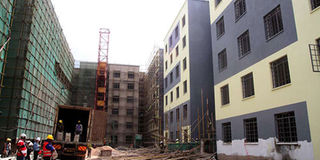Take radical steps to stem corruption

Construction of rental houses under the affordable housing project underway in Park Road, Nairobi, on July 17, 2019. Rethinking how projects are conceived, financed and implemented would be fresh air for Kenyans. PHOTO | FILE | NATION MEDIA GROUP
What you need to know:
- The systemic corruption has eroded the performance of big infrastructure projects through delays in implementation, poor quality of output and cost overruns.
- The government should adopt innovative ways of financing and implementing infrastructure projects to reduce the risks of corruption and wastage.
The raging controversy over corruption and wastage in Kenya’s big infrastructure projects calls for re-thinking of financing and management of such projects.
While the development of major roads, railways, energy, water, pipelines and ports networks, is considered necessary to rev up economic growth, the vulnerability of such projects to corruption and poor implementation renders them impotent, hence, unable to deliver the economic benefits for which they were conceived.
Funding for big infrastructure, accounting for 30 per cent of the annual budget and 10 per cent of the national output, is supposed to ease bottlenecks to economic growth by stimulating private sector growth and enhanced public service delivery.
In the 2019/20 budget, the government allocated over Sh400 billion or 50 per cent of development budget, to the big infrastructure buckets including Sh180.9 billion to roads, Sh75.4 billion to railways and ports, Sh68.9 billion to energy, Sh55.8 billion to water and environment and Sh17.2 billion to Information and Communication Technology projects.
GROWTH RANKING
These statistics from the National Treasury show how much the government has scaled up funding from taxes and development partners to finance its infrastructure deficit.
According to the World Bank, Kenya should invest $4 billion (Sh400 billion) annually to bridge its infrastructure gap.
A report by the Bank on April 2018 indicated that Kenya experienced a financing gap of $2.1 billion each year and needed to encourage the private sector to invest in infrastructure and social services.
Even after raising more funding for infrastructure, Kenya still needs to make prudent investment decisions to build the scale and quality of infrastructure that would support rapid economic growth and social transformation.
The latest Infrastructure Development Index scored Kenya’s performance in infrastructure development at 25.9 points (out of 100) in 2019.
While Kenya has more developed infrastructure than most of its peers, the index published by the African Development Bank ranks Kenya below the Africa average of 28 points.
DELAYS
Some of the better performers include Ghana, which achieved an index of 29.5, Mauritius 77.5, South Africa 78.4, Egypt 87 and Seychelles 95.
Although Kenya’s performance shows a marked improvement in the past decade, from just 11.49 in 2009, the index shows a peculiar stagnation from 2015 — when the index reached 24 points, then dragged by a mere one percentage point for the next three years.
This underlines the strange coincidence between how much was budgeted for infrastructure each year and how much was lost to corruption and wastage in big dams, pipeline, energy and roads.
The systemic corruption has eroded the performance of big infrastructure projects through delays in implementation, poor quality of output and cost overruns.
Essentially, many of these projects have failed to deliver their envisaged economic benefits to the target beneficiaries and the economy.
FORENSIC AUDIT
Radical measures should be taken to stem such corruption. The first step that the government should take is to carry out a forensic audit of all the big infrastructure projects under implementation and those that have failed to take off.
The purpose of a comprehensive audit of all the key stages and processes of the project should be to establish how each project was conceived, how it was funded, who was involved at each of the approval processes and whether, indeed, the project was good value for money.
This background should also help to understand whether the project was motivated by economic interests or it was driven by vested interests of the tenderpreneurs and public officials involved.
The government should also adopt innovative ways of financing and implementing infrastructure projects to reduce the risks of corruption and wastage.
COLLABORATION
A viable option is to rapidly scale up public-private partnerships. Inviting the private sector to take the lead in big infrastructure project would increase efficiency in the allocation of resources and reduce delays in the implementation of the projects.
The critical processes that are prone to corruption, including contract procurement, administration and payments, should be moved away from the public sector.
These functions should be outsourced to external agencies that have no vested interest in the projects and are less likely, than public officials, to be compromised.
Rethinking how projects are conceived, financed and implemented would be fresh air for Kenyans, whose livelihoods are polluted by the toxic looting of public funds.
Without radical action, the government would continue locking the stables after the horses have bolted.
Peter Warutere is a director of Mashariki Communications; [email protected]





